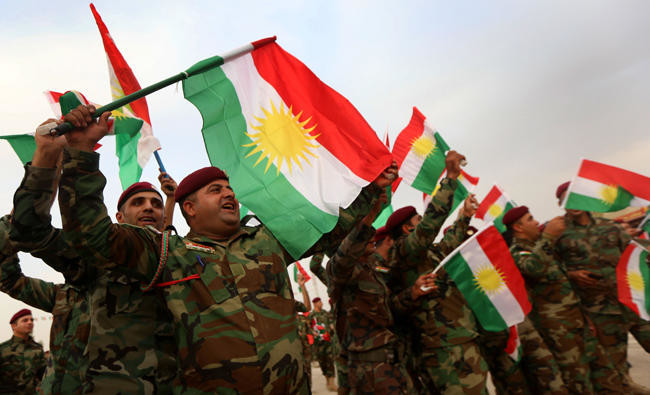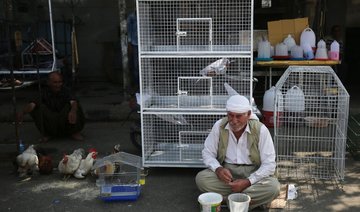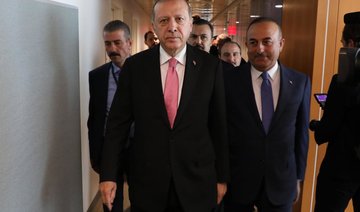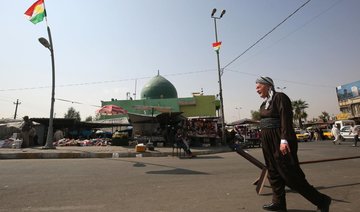ANKARA: Turkey, Iran and Iraq on Thursday warned of possible countermeasures against the Kurdish Regional Government (KRG) if it goes ahead with its independence referendum for Iraqi Kurdistan.
The foreign ministers of the three countries issued a joint statement underlying their concerns that the referendum, scheduled for Sept. 25, could trigger regional conflicts.
“The three ministers emphasized that the referendum will not be beneficial for the Kurds and the KRG, and agreed, in this regard, to consider taking countermeasures in coordination,” the statement read, without elaborating on the measures.
The statement urged the international community to intervene, reiterated the ministers’ commitment to maintaining Iraq’s territorial and political unity, and described the referendum as unconstitutional.
Turkey has the largest Kurdish population in the region, and Ankara — which said the vote would be a “grave mistake” — worries that it could boost separatist sentiment among Turkish Kurds.
Considered a terror organization by Turkey, the US and EU, the Kurdistan Workers’ Party (PKK) has been conducting an armed insurgency against the Turkish state for more than three decades.
As a show of force, Turkey moved tanks and troops to its southern border with Iraq ahead of the vote, with rocket launchers affixed on armored vehicles directed at the frontier.
Turkey’s Habur border crossing is economically vital for the KRG, as it is the main passageway for cross-border trade for landlocked Iraqi Kurdistan.
Trade between Turkey and KRG reached $8.5 billion last year, and there are about 1,300 Turkish companies operating in Iraqi Kurdistan. Turkey is also a key buyer of oil and natural gas from the KRG.
Ahmad Majidyar, resident fellow and director of the IranObserved project at the Middle East Institute in Washington, said the joint statement means to send a strong signal to the US and European powers that if they do not stop the referendum, the consequences will be dire.
“Both Turkey and Iran have threatened retaliatory measures, including border closures and economic sanctions, if the KRG goes ahead with the referendum. But it’s too soon to determine if their tough rhetoric will translate into action,” Majidyar told Arab News.
But despite recent steps by Tehran and Ankara to reconcile their differences and cooperate more on regional issues, there is deep distrust between them, he added.
“Turkey, for example, wouldn’t want to cut all relations with the KRG and allow Iran and other regional countries to fill the void,” he said.
Although Ankara has legitimate fears about the referendum, Majidyar said it has to consider both its strategic and economic interests, as Iraqi Kurdistan exports more than 500,000 barrels of oil per day via Turkey to the Mediterranean.
“Irbil and Ankara have also had close military cooperation, and Turkey has military bases in Iraqi Kurdistan,” he added.
“It’s unlikely that Ankara will sever all relations with the KRG, even if the latter proceeds with the referendum next week.”
Mehmet Seyfettin Erol, head of the Ankara-based think tank ANKASAM, told Arab News that the joint statement is an ultimatum to the KRG, and shows its three neighbors’ determination to coordinate against a perceived common threat.
Gulriz Sen, an Iran expert at TOBB University in Ankara, said the statement demonstrates a strong alignment of interests in opposing Kurdish demands and aspirations for independence.
“Even though maintaining the territorial integrity of Iraq has always been a common objective for Turkey and Iran, regional geopolitics so far have drawn Turkey and Iran apart by deepening their rivalry in the Syrian and Iraqi crises,” Sen told Arab News.
“This statement once again shows their mutual stance vis-a-vis the Kurdish issue. There were already hints of possible cooperation and coordination with the high-level visit of Iran’s chief of staff, Gen. Mohammad Bagheri.”
Sen said the three countries seem united in exerting military and economic pressure on the KRG, as shown by Turkey’s recent military drill at the Iraqi border.
Turkey’s National Security Council and Cabinet will convene on Friday to announce what countermeasures will be taken if the referendum goes ahead.
Turkey, Iran, Iraq join forces to thwart Kurdish referendum
Turkey, Iran, Iraq join forces to thwart Kurdish referendum

Israeli strikes on Iran have killed at least 950 people and wounded 3,450 others, a human rights group says

- US to strike Iran ”will be a legitimate target for our armed forces,” the state-run IRNA news agency reported
DUBAI, United Arab Emirates: Israeli strikes on Iran have killed at least 950 people and wounded 3,450 others, a human rights group said Monday.
The Washington-based group Human Rights Activists offered the figures, which covers the entirety of Iran. It said of those dead, it identified 380 civilians and 253 security force personnel being killed.
Human Rights Activists, which also provided detailed casualty figures during the 2022 protests over the death of Mahsa Amini, crosschecks local reports in the Islamic Republic against a network of sources it has developed in the country.
Iran has not been offering regular death tolls during the conflict and has minimized casualties in the past. On Saturday, Iran’s Health Ministry said some 400 Iranians had been killed and another 3,056 wounded in the Israeli strikes.
What do we know about US strikes on Iran’s nuclear facilities?

- Tehran says damage limited, no radiation leaks after Trump declares Iran’s uranium-enrichment capabilities destroyed
- Assault involved 14 bunker-buster bombs, more than two dozen Tomahawk missiles and over 125 military aircraft
DUBAI: Amid mounting speculation, the US launched air strikes on three of Iran’s nuclear facilities on Saturday.
The operation aimed to support Israel in its war against Iran — ongoing since June 13 — by crippling Tehran’s uranium enrichment capacity, according to Asharq News.
US President Donald Trump later announced that Iran’s uranium-enrichment abilities had been eliminated, warning Tehran against any “retaliatory response.” Tehran, however, described the damage as “limited” and dismissed any indications of radiation leaks.

The US strikes included 14 bunker-buster bombs, more than two dozen Tomahawk missiles and over 125 military aircraft, in an operation the top US general, General Dan Caine, said was named “Operation Midnight.”
Asharq News reported that the strikes targeted three critical nuclear facilities instrumental in Iran’s nuclear fuel cycle: Fordo, Natanz and Isfahan nuclear complex.
These sites span the entire fuel-enrichment chain — from raw uranium conversion, through enrichment, to the production of fuel and technical components for research reactors.
FASTFACTS:
• The first B-2 bomber was publicly displayed on Nov. 22, 1988, but its first flight was on July 17, 1989.
• The combat effectiveness of the B-2 was proved in the Balkans, where it was responsible for destroying 33 percent of all Serbian targets in the first eight weeks.
• In support of Operation Enduring Freedom, the B-2 flew one of its longest missions to date from Whiteman to Afghanistan and back.
• The B-2 completed its first-ever combat deployment in Iraq, flying 22 sorties and releasing more than 1.5 million pounds of munitions.

Fordo facility
Location and structure: Fordo is 30 kilometers northeast of Qom, embedded within a mountain at an altitude of approximately 1,750 m, with over 80 meters of rock and volcanic shielding — making it one of Iran’s most fortified sites.
Technical role: It houses two underground halls that can hold about 3,000 IR-1 centrifuges, enriching uranium up to 60 percent — a level nearing weapons -grade.
Strategic importance: It is a primary target in any military effort to prevent Iran from achieving nuclear military capability, due to its high capacity and protection.

Natanz reactor
Location and structure: Situated near Kashan in central Iran, partially buried under about 8 meters of earth with a 220meter-thick concrete roof, naturally shielded by surrounding mountainous terrain.
Technical role: Contains primary and experimental plants with over 14,000 centrifuges (IR-1, IR-2m, IR-4, IR-6), making it Iran’s main industrial enrichment hub.
Strategic importance: Responsible for producing most of Iran’s low-enriched uranium and plays a key role in centrifuge development.

Isfahan nuclear complex
Location and structure: Located south of Isfahan on an arid plateau away from populated areas, it is neither buried nor heavily fortified.
Technical role: Includes a Uranium Conversion Facility (UCF); a research reactor fuel production plant; and a metallic fuel pelletizing plant, and three research reactors.
Strategic importance: Serves as the backbone of Iran’s nuclear research and production infrastructure, supplying both Natanz and Fordo.
The Pentagon used some of the world’s most advanced aircraft for Saturday’s strikes. The B-2 Spirit is a multi-role bomber capable of delivering both conventional and nuclear munitions.
The bomber represents a major milestone in the US bomber modernization program. The B-2 brings massive firepower to bear anywhere on the globe through seemingly impenetrable defenses.

According to US officials, the bombers that carried out the Iran strikes flew for nearly 37 hours non-stop from its Missouri base, refueling in mid-air multiple times before striking in the early hours of Sunday.
A B-2 bomber offers several key advantages, primarily due to its stealth capabilities and global reach.
• A range over 11,000 km without refueling, capable of global reach from distant American bases.
• Stealth abilities such as flying-wing design and radar-absorbing materials that allow it to evade air defenses.
• It can carry both nuclear and conventional weapons, including the GBU‑57 bunker-buster bomb.
Initial reports quoted by Asharq News indicated that Fordo was hit with the GBU‑57, the most powerful US conventional bunker buster, designed for deeply buried targets like Fordo, which lies 90 meters underground. Fox News reported six bunker-busting bombs were dropped on Fordo, alongside approximately 30 Tomahawk cruise missiles fired at Natanz and Isfahan.

The GBU‑57 ‘Massive Ordnance Penetrator’ was designed by American military engineers to devastate deeply buried bunkers without radioactive fallout. It was the only nonnuclear weapon that could reach Iran’s hardest target.
• Weight: ~13,600 kg
• Length: 6.2 meters.
• Diameter: 0.8 meters.
• Explosive payload: 2,400 kg of high explosives.
• Guidance: GPS + inertial navigation.
* Penetration: Up to 60 meters of reinforced concrete or dense rock.
A Tomahawk cruise missile is a precision weapon that launches from ships, submarines and ground launchers and can strike targets precisely from a great distance, even in heavily defended airspace.

• Range: 1,250–2,500 km depending on variant.
• Speed: Subsonic (~880 km/h).
• Guidance: Inertial navigation, GPS, with some variants using terminal guidance (TERCOM, DSMAC).
• Warhead: ~450 kg conventional explosives.
• Launch platforms: Ships and submarines.
There has been a torrent of responses to the US move against Iran, Asharq News reported. President Trump declared the mission’s success, stating that the Fordo facility was “gone,” and Iran’s primary nuclear enrichment sites “completely and utterly destroyed.” Later on Sunday, US Defense Secretary Pete Hegseth said the strikes were an incredible and overwhelming success that have “obliterated Tehran’s nuclear ambitions.”
For its part, Iran’s Tasnim News Agency quoted an official saying the nuclear sites had been evacuated in advance, and the damage was “not irreparable.” The Atomic Energy Organization of Iran stated there was “no risk of any radiation leak.” Iran emphasized its nuclear industry would not be halted.

Israel rejects critical EU report ahead of ministers’ meeting

- European nations have been increasingly critical of the massive civilian toll of Prime Minister Benjamin Netanyahu’s military campaign against Palestinian militant group Hamas since its October 7, 2023 attack on Israeli communities
BRUSSELS: Israel has rejected a European Union report saying it may be breaching human rights obligations in Gaza and the West Bank as a “moral and methodological failure,” according to a document seen by Reuters on Sunday.
The note, sent to EU officials ahead of a foreign ministers’ meeting on Monday, said the report by the bloc’s diplomatic service failed to consider Israel’s challenges and was based on inaccurate information.
“The Foreign Ministry of the State of Israel rejects the document ... and finds it to be a complete moral and methodological failure,” the note said, adding that it should be dismissed entirely.
European nations have been increasingly critical of the massive civilian toll of Prime Minister Benjamin Netanyahu’s military campaign against Palestinian militant group Hamas since its October 7, 2023 attack on Israeli communities.
Palestinians waiting for humanitarian aid killed in airstrike

- The airstrike targeted the built-up Nuseirat refugee camp in central Gaza, according to Al-Awda Hospital, where the bodies were brought
- It said another 22 people were wounded while waiting for aid trucks
TEL AVIV: At least four Palestinians were killed on Sunday in an Israeli airstrike and 22 were wounded while waiting for humanitarian aid, according to a local hospital.
The airstrike targeted the built-up Nuseirat refugee camp in central Gaza, according to Al-Awda Hospital, where the bodies were brought.
It said another 22 people were wounded while waiting for aid trucks.
Palestinian witnesses and health officials say Israeli forces have repeatedly opened fire on crowds seeking desperately needed food, killing hundreds of people in recent weeks.
The military says it has fired warning shots at people it said suspiciously approached its forces.
Separately, World Central Kitchen, the charity run by celebrity chef Jose Andres, said it had resumed the distribution of hot meals in Gaza for the first time in six weeks after shutting down because of Israel’s blockade, which was loosened last month amid fears of famine.
Also on Sunday, the Israeli military said that it had recovered the remains of three hostages held in the Gaza Strip.
The military identified the remains as those of Yonatan Samerano, 21; Ofra Keidar, 70; and Shay Levinson, 19.
All three were killed during Hamas’ Oct. 7, 2023, attack into Israel that ignited the ongoing war.
Hamas is still holding 50 hostages, fewer than half of them believed to be alive.
The military did not provide any details about the recovery operation, and it was unclear if the airstrike was related to it.
“The campaign to return the hostages continues consistently and is happening alongside the campaign against Iran,” Prime Minister Benjamin Netanyahu said in a statement.
Kobi Samerano said in a Facebook post that his son’s remains were returned on what would have been Yonatan’s 23rd birthday.
Militants killed some 1,200 people, and abducted 251 people in the Oct. 7 attack.
More than half the hostages have been returned in ceasefire agreements or other deals, eight have been rescued alive, and Israeli forces have recovered dozens of bodies.
Israel’s retaliatory offensive has killed over 55,000 Palestinians, according to Gaza’s Health Ministry, which has said that women and children make up more than half of the dead. It does not distinguish between civilians and combatants.
The Hostages Families Forum, the main organization representing families of the hostages, has repeatedly called for a deal to release the remaining captives.
“Particularly against the backdrop of current military developments, we want to emphasize that bringing back the remaining 50 hostages is the key to achieving any sort of victory,” it said in a statement on Sunday.
Hamas has said it will only release the remaining hostages in return for more Palestinian prisoners, a lasting ceasefire, and an Israeli withdrawal from Gaza.
Netanyahu has rejected those terms, saying Israel will continue the war until all the hostages are returned and Hamas is defeated or disarmed and sent into exile.
Even then, he has said Israel will maintain lasting control over Gaza and facilitate what he refers to as the voluntary emigration of much of its population, plans the Palestinians and others view as forcible expulsion.
The US, Qatar, and Egypt have been trying to broker a new ceasefire and hostage release after Israel ended a truce in March with a surprise wave of airstrikes.
Those talks appear to have made little progress as Israel has expanded its air and ground offensive.
Twenty killed in suicide bombing at Damascus church

- It was the first suicide bombing in Damascus since Bashar Assad was toppled
- Syria’s interior ministry said the suicide bomber was a member of Daesh group
At least 20 people were killed and dozens injured when a suicide bomber blew himself up at the Mar Elias Church in the Dweila neighborhood of Syria’s capital Damascus on Sunday, health authorities and security sources said.
It was the first suicide bombing in Damascus since Bashar Assad was toppled in December. Syria’s interior ministry said the suicide bomber was a member of Daesh (Islamic State). He entered the church, opened fire and then detonated his explosive vest, a ministry statement added.
A security source, speaking on condition of anonymity, said two men were involved in the attack, including the one who blew himself up.
Daesh has been behind several attempted attacks on churches in Syria since Assad’s fall, but this was the first to succeed, another security source told Reuters.
Syria’s state news agency cited the health ministry as saying that 52 people were also injured in the blast.
A livestream from the site by Syria’s civil defense, the White Helmets, showed scenes of destruction from inside the church, including a bloodied floor and shattered pews and masonry.
Syrian President Ahmed Al-Sharaa, who led the offensive against Assad before taking over in January for a transitional phase, has repeatedly said he will protect minorities.
“We unequivocally condemn the abhorrent terrorist suicide bombing at the Mar Elias Greek Orthodox Church in Damascus, Syria,” the Greek foreign ministry said in a statement.
“We demand that the Syrian transitional authorities take immediate action to hold those involved accountable and implement measures to guarantee the safety of Christian communities and all religious groups, allowing them to live without fear.”
Daesh had previously targeted religious minorities, including a major attack on Shiite pilgrims in Sayeda Zainab in 2016 — one of the most notorious bombings during Assad’s rule.
The latest assault underscores the group’s continued ability to exploit security gaps despite the collapse of its territorial control and years of counterterrorism efforts.




















